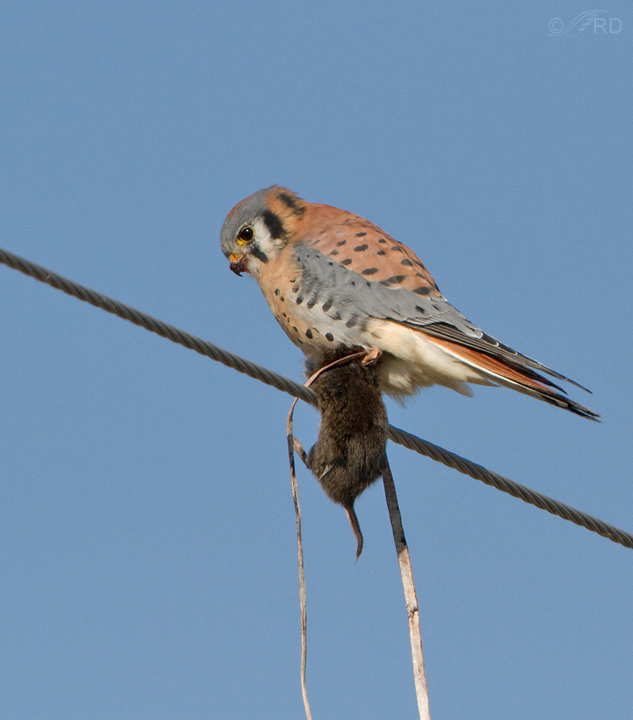Just a quick post this morning to announce some more good news on the “lost falconry bird” front. (no, the female kestrel hasn’t yet been recaptured, but I believe efforts are continuing).
For those new to this issue, a quick summary: Occasionally, falconry birds escape through no fault of the handler. When they do, they typically still have falconry gear attached – jesses, anklets, telemetry gear etc. Every effort is made by the falconry community to recapture these birds, usually with success. The larger segment of the problem comes from unethical “rogue” or “wannabe” falconers who capture wild birds illegally and then try to fly them without proper knowledge and experience. Due to negligence or inexperience these illegal birds sometimes escape with their “gear” attached, which puts them at a distinct disadvantage in the wild. My good friend and constant photography companion Mia McPherson and I have come across and photographed three of these escaped birds in the last three years. At least two of the three were most likely the result of rogue falconers rather than the organized falconry community. More details of what has already transpired can be found here.
When someone spots one of these escaped birds in the wild, getting through to the “right” person for reporting and appropriate action is cumbersome, time-consuming and frustrating (believe me, I know!). It’s difficult to get through all the layers of DWR’s bureaucracy, finding a rehabber who can help isn’t easy and there hasn’t been an efficient avenue for a non-falconer to report a found bird to the falconry community. The North America Falconer’s Association (NAFA) website has a form for reporting lost birds but it’s only been available to members and not the general public. Many lost birds are found by non-falconers.
But that has now changed. Thanks to the efforts of master falconer Mark Runnels, Utah Falconers Association president Chris Wall and NAFA President Larry Dickerson, the NAFA website now has a reporting form that is available to the general public – no username and password required. Larry will assign an appropriate person to monitor these reports. When a lost bird is reported by a falconer or anyone else, word will be sent out quickly so that appropriate action can be taken.
- The actual report form can be found here.
- The NAFA website can be found here. The lost bird reporting form is in the drop-down menu under “About Falconry”.
I think this development is a big deal. There are many thousands of birders, bird photographers, nature lovers and others in the field every day, many with scopes and binos, looking for and at birds. Who knows how many lost falconry birds (most from rogue falconers) they might see. And now they have an efficient avenue through which to report them.
The next step is to publicize this new asset. I hope that many of you will help to spread the word to your friends and acquaintances who care about the welfare of birds.

Meet “Jack”. This is the male American Kestrel that Mia and I found three years ago. Normally we don’t give names to birds but we couldn’t help it in this case since we saw him so often in the same area as we were traveling to one of our favorite bird photography spots. When I took this photo, Jack had just dived to the ground within about 10′ of my pickup and snatched this vole and then landed on the wire directly above us.
I’ve been told that these jesses are illegal because they’re too long – an ethical, licensed falconer would never use them. I’m sure you can see the dangers to the bird of having to “make a living” in the wild with these jesses still attached.
As Larry Dickerson said in his email last night, ” if we help one (bird), it will be worth it”. I suspect that, over the long haul, we can help many more birds than that.
I applaud the falconry community for their efforts. Those folks really do care deeply about their birds!
Ron


Ron- It’s not often that one is able to move an issue in a positive direction or affect change for good purposes. I applaud you for your advocacy on this issue.
Thank you, Chuck.
Thanks to all who have commented so far. I agree, this is great news for lost birds. Now, if the word only gets out…
That is truly wonderful news. And, while you discount it, you and Mia have had a part to play in this huge step forward. Thank you.
Great reporting and useful information which I’ll pass along every chance I get.
Ron, I want to publicly thank you for your involvement in our project. And to your readers, I want to also express my appreciation for being supportive in our cause. I will point out that the reporting solution, in its current state is still in its infancy. While the page is available, there is still some maturing of the logistics that are being worked out. It won’t be perfect out of the chute, but as you have stated many times over the past few weeks, we are working toward a positive solution that will take everyone to implement.
Ron, thank you for all you do.
Chris
Excellent news indeed. Thanks for your hard work and for giving us the link to the reporting form. If I see a lost falconry bird, I’ll be sure to report it.